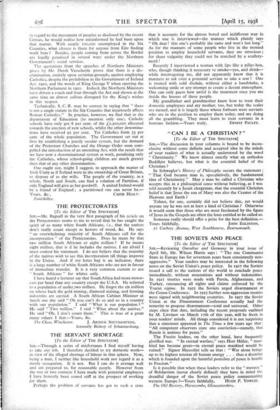THE SOVIETS AND PEACE
[To the Editor of THE SPECTATOR] Sta,—Reviewing Ourselves and Germany in your issue of April 8th, Mr. Wilson Harris says : " The one Cominunist State in Europe has for seventeen years been consistently non- aggressive." Your readers may be interested in the following notes on the Soviet Union's peace policy. In 1917 the Soviets issued a call to the nations of the world to conclude peace immediately, without annexations and without indemnities. In 1921 treaties were made with Persia, Afghanistan, and Turkey, renouncing all rights and claims enforced by the Tsarist regime. In 1922 the Soviets urged disarmament at the Genoa Conference. In 1925 further non-aggression treaties were signed with neighbouring countries. In 1927 the Soviet Union at the Disarmament Conference actually had the temerity to propose disarmament—total and universal. Other steps since that date, including the recent proposals outlined by M. Litvinov on March 17th of this year, will be fresh in your readers' minds. All things considered it is not surprising that a statement appeared in The Times a few years ago that: "All competent observers state one conviction—namely, that Russia is anxious for peace."
The Fascist leaders, on the other hand, have frequently glorified war. " In eternal warfare," says Herr Hitler, " man- kind has become great—in eternal peace mankind would be ruined." Signor Mussolini tells us that : " War alone brings up to its highest tension all human energy . . . thus a doctrine which is founded upon the harmful postulate of peace is hostile to Fascism."
Is it possible that when these leaders refer to the " menace " of Bolshevism (never clearly defined) they have in mind the dreadful danger of the Soviet peace policy contaminating






































 Previous page
Previous page